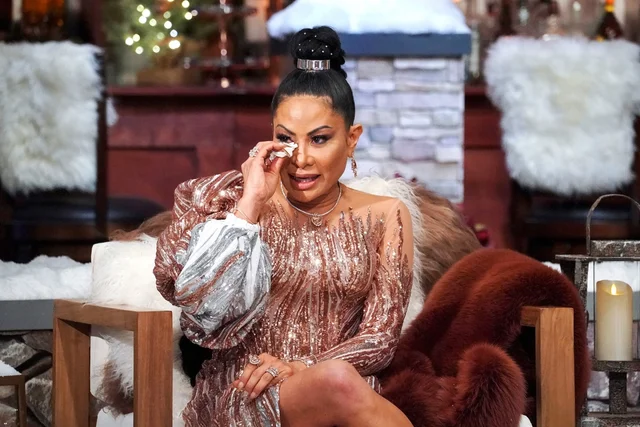By Christina Noravian

Once upon a time there was an elite social circle that was the most dramatic in all the land. This circle was just like all the rest – fueled by beauty, wealth, and perfection, of course – except there was one key difference: the women’s lives were filmed and broadcast on national television. And each day as their fights grew more intense, viewers flocked to their screens ever more excitedly, eager to see what life in this far far away land had in store.
This story, however, is not one that takes place in a land as “far far away” as we may initially think. In fact, The Real Housewives of Salt Lake City (RHOSLC) is a reality television series that offers viewers a thrilling inside look into the drama-filled lives of a group of affluent Utah natives. As these women navigate their personal and professional lives, conversations surrounding Mormonism and cults, battles in the courtroom, provocative family drama, and countless explosive arguments shape their storylines. One housewife in particular, Jen Shah, stands at the center of the group as a self-proclaimed “queen bee and MVP” (RHOSLC S1E1). Shah garners much attention for her assertive, extravagant personality and sharp tongue, both of which often land her in trouble with her fellow housewives and, more recently, with the federal court of law. In March 2021, Shah was arrested by members of Homeland Security for conspiracy to commit wire fraud in connection with a telemarketing scheme that victimized and deceived countless elderly people for nearly a decade. Though Jen was involved in this scheme for over nine years, she presents a contrasting character on the show as a short-fused, yet well-meaning and dedicated mother, wife, and friend. Jen’s duplicitous identity, along with her capacity for deception and theft, all draw striking parallels to female fairy tale tricksters who use similar means to secure their autonomy and free themselves and others from harm or oppression. Jen Shah’s reality television fame and subsequent legal drama on The Real Housewives of Salt Lake City series exemplifies Maria Tatar’s reimagined female trickster as a figure who simultaneously exists at the center and the margins of our cultural conceptions to deceive society, rescue others, and save herself (or at least attempt to). As a trickster, Jen subverts heteronormative conventions to redefine what it means to be a “real” housewife; through her interruption of gender norms, she reimagines female power and expands women’s sphere of influence beyond domesticity to question normative societal assumptions of what a woman should be.
Before exploring the connection between Jen Shah and female tricksters, we must first establish how The Real Housewives provides an effective lens to study fairy tales and female tricksters through. As scholar Lori Landay argues, to identify a female trickster we must look “from the margins of dominant society to the centers of women’s space – the parlors, kitchens, and bedrooms of domesticity,” or in this case, the reality television screen, to identify their core spheres of influence (McAndrews 190). Female tricksters are powerful, active agents who “operate using strategies both subversive and transformative in order to construct their own identities but also to effect social change” (Tatar 461). With such dynamic power to subvert, critique, and transform dominant power structures, it is important to note that just because “the female trickster migrated into fairy tales” and onto the television screen, her “mythic power” is “in no way diminished” (Tatar 467). In fact, that the female trickster figure survives in such a multitude of settings only proves her mastery in adapting to and existing under a variety of sociocultural conditions. Furthermore, her subversion of societal structures allows the female trickster to operate outside of the space allotted to her to ultimately expand her sphere of influence beyond domestic conventions.
Jen’s identity as a woman of color within a largely white community sets the stage for her elaborated career as a modern trickster figure. As a Tongan, Hawaiian, and Chinese woman who moved from Hawaii to Utah at “about six to seven years old,” she “often [sticks] out in her traditionally white, Mormon world” (RHOSLC S1E1; Malec par. 22). On the show, Jen states that “people in Utah have no clue what [she] is” (RHOSLC S1E1). In a state that hosts “the nicests racists you’ll ever meet,” Jen is perceived as “Black, [purely] because they don’t know any better” (Malec par. 12; RHOSLC S1E1). As a minority in her home state, Jen clearly sticks out from Utah’s dominant racial makeup and faces continual ignorance, marginalization, and misinterpretation. Similarly, female tricksters “exist quite openly but [are also] ignored, marginalized, manipulated, and criticized by dominant culture for crossing social boundaries” (McAndrews 189). Jen’s unique place within Utah’s social order, however, perfectly positions her as a female trickster who “has survived and endured simply by becoming invisible and flying beneath the radar that we use to understand our cultural stories” (Tatar 460). Jen’s marginalized identity is thus a tool that helps her acts of deception and trickery go unnoticed, even as she assumes a very public role on The Real Housewives series.

Though not immediately noticeable, Jen’s actions are riddled with gender-bending contradictions that aid in her subversion and help navigate her path to autonomy. A steadfast adherent of Western beauty standards and domestic norms, her dedication to plastic surgery and family alike reveal Jen’s obsessive control over her constructed image. What accompanies her image, however, are assertive, bold, and oftentimes violent qualities that stand in sharp contrast to the docility and innocence typically ascribed to a housewife. In mimicking seemingly masculine traits while maintaining the physical image of an idealized woman, Jen exists at the center of a cultural contradiction. As any female trickster, Jen’s “appeal derives in large part from her ability to serve as an ironic double on the classic male trickster, masquerading, performing, and imitating in ways that offer both serious reenactment and gender-bending parody” (Tatar 464). For example, while relaxing in an outdoor bathtub at a luxury spa, Jen vents to two other housewives, Whitney and Heather, about an incident which incited Jen’s temper and led her to shatter a glass on the floor: “I trusted you guys as my fucking friends… and Whitney, fucking roll your mother fucking eyes and look over there one more time I will drown you bitch … [proceeds to splash water at the camera]” (RHOSCL S1E10). Whether actively fighting with her fellow housewives, shattering glassware, or inflicting water damage onto camera equipment, Jen’s strong-willed dominance blurs the lines of how a housewife should act. Her interruption of gender norms and embodiment of a more fluid notion of gender and social identity negotiates autonomy in its exploration of life outside of feminine domesticity. In doing so, Jen “emerges from oppression to self-expression” as she struggles toward a selfhood outside of her prescribed sphere of influence (Jurich 278).


Like any successful female trickster, Jen is a shapeshifter – a master of duplicity, theft, and transformation – who leverages her skills to advance her place in the world. As an extravagant party host, she boasts that “Jen Shah parties turn into a grand transformation, okay? I don’t need Coach Shah [her husband] stepping up in here asking me questions, asking me how much shit costs, ‘where’s the furniture?,’ ‘what happened to our home?’ I don’t need all that” (RHOSLC S1E1). Evidently, Jen possesses the innate capacity to not only transform physical spaces, but also to transform herself, masquerading as a flamboyant, sharp-witted, and short-fused figure in her time on the screen. For Jen, the home transforms from a confining space to a place of welcoming others and engaging them in her subtle subversions; free from her husband’s command, Jen’s house parties stand in irony to “the cultural dictates that limit women’s place to the home” (McAndrews 190). These flashy transformations, however, also distract from the duplicity and deception Jen employs to establish her career as a business owner and “mom-trepreneur.” Knowing she helped orchestrate a telemarketing scheme “where ordinary people, vulnerable people, often elderly people, would be tricked into giving up their life savings for products” that really had no value, Jen embodies the “trickster tactics of deception, impersonation, theft, duplicity, and subversion in [her] attempts to secure autonomy” (ABC News; McAndrews 190). Similar to Scheherazade in Thousand and One Nights, who scholars view as the original female fairy tale trickster, Jen “knows better than to reason, beg, plead, bargain, preach or scold. Instead, she relies on the only strategy available to the powerless: deceit” (Tatar 461). And amidst the deceit, duplicity, and theft Jen employs for nearly ten years, her trickster transformations enable her to take on a dual-identity, with one side guilty of committing wire fraud and the other claiming innocence and arguing “the only thing [she is] guilty of is being Shah-mazing” (RHOSLC S2).

Despite this trickster’s best efforts, however, Jen’s once upon a time does not guarantee a happily ever after – her guilty plea earlier this year was followed by moments of complete emotional collapse, despair, and anxiety amid an impending fifteen-year prison sentence. In July 2022, Jen unexpectedly pled guilty to her charges, stating that “from 2012 to March 2021, … [she] agreed with others to commit wire fraud” (Lang par. 3). Repeatedly stating on the show and in interviews that she is “at the lowest point of [her] life,” Jen’s downfall reflects Tatar’s argument that “there is clearly something compensatory in the psychological fragility of these women warriors: their gains in intellect and muscle are diminished by moments of complete emotional collapse. Vulnerability continues to attract” (Chavez par. 2; Tatar par. 7). Whether scripted in a fairy tale, broadcast on television, or simply living in modern society, Jen’s adversity suggests no matter how hard they try, women are all subject to the same fate: struggle, vulnerability, and collapse. As author Marilyn Jurich notes, “suffering appears to be what women are actively permitted to do to the exclusion of happier pastimes” (Jurich 276). Though we may not condone Jen’s criminal activity, part of us remains intrigued and invested in how far this trickster can push social boundaries and negotiate her own space within them. As a trickster rather than a villain, Jen’s trailblazing (though illegal) offers an admirable complexity; we want to see her win because we too want to reimagine a world where women like Jen are expected to succeed. Thus, by flipping reality on its head, Jen’s actions interrupt dominant systems of power and insert small, yet hopeful pockets of change wherein women are free to exist as fully-embodied beings.

Female tricksters like Jen navigate a space outside of oppression by subverting dominant social structures. Because Jen’s character is “shamelessly exploitative and exploratory,” she reminds us that “every culture requires a space for the disruptive energy” of trickster characters like herself (Tatar par. 10). When female tricksters subvert reality, however, we are ultimately called to question what makes that reality in the first place. As Tatar writes, heroines who “become enmeshed in cultural contradictions … unsettle and disturb us, obliging us to rethink how we have made the world” (Tatar 467). Though Jen’s interpersonal disruptions and gender-bending parodies on the screen surely reverberate and affect larger societal structures, she, like many other women, is ultimately defeated by the powers that she sought to escape. Jen may not be a perfectly reimagined role model for modern housewives, but her efforts to secure autonomy and disrupt gender norms highlight an opportunity for future female tricksters to soon follow in her footsteps. For although she is likely going to jail for many years, Jen successfully redefines womanhood and domesticity to “perform a part of the cultural work of transforming the feminine into the human” (McAndrews 192). And truly, there is no realer feat than that.
Works Cited
ABC News. ‘Real Housewives’ Star Pleads Guilty to Fraud in Telemarketing Scam. YouTube, YouTube, 12 July 2022, https://www.youtube.com/watch?v=SZjRRTLRxB4.
Chavez, Paul. “Real Housewives of Salt Lake City: Jen Shah Tearfully Declares Innocence to Husband Sharrieff Shah.” Daily Mail Online, Associated Newspapers, 13 Dec. 2021, https://www.dailymail.co.uk/tvshowbiz/article-10302913/Real-Housewives-Salt-Lake-City-Jen-Shah-tearfully-declares-innocence-husband-Sharrieff-Shah.html.
Jurich, Marilyn. “She Shall Overcome: Overtures to the Trickster Heroine.” Women’s Studies International Forum, vol. 9, no. 3, 1986, pp. 273–279., https://doi.org/10.1016/0277-5395(86)90063-4.
Lang, Cady. “Real Housewives Star Jen Shah Just Pled Guilty to Fraud. Here’s What Happens Next.” Time, Time, 11 July 2022, https://time.com/6194686/jen-shah-guilty-fraud-real-housewives/.
Malec, Brett. “The Real Housewives of Salt Lake City’s Jen Shah on Racism, Leaving the Mormon Church & More.” E! Online, 11 Nov. 2020, https://www.eonline.com/news/1206922/the-real-housewives-of-salt-lake-citys-jen-shah-on-racism-leaving-the-mormon-church-more.
McAndrews, Kristin M. Review of Madcaps, Screwballs, and Con Women: The Female Trickster in American Culture, by Lori Landay. Marvels & Tales: Journal of Fairy-Tale Studies, 14 , no. 1, 2000, pp. 189–192, JSTOR, https://www.jstor.org/stable/41380761.
Tatar, Maria. “Female Tricksters as Double Agents.” The Classic Fairy Tales, 2nd ed., W.W. Norton Et Company, 2016.
Tatar, Maria. “Sleeping Beauties vs. Gonzo Girls.” The New Yorker, 8 Mar. 2013, https://www.newyorker.com/books/page-turner/sleeping-beauties-vs-gonzo-girls#ixzz2MydRxnPs. The Real Housewives of Salt Lake City. Bravo, 2020.